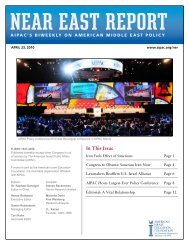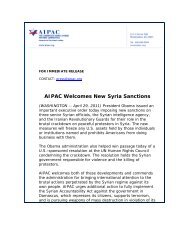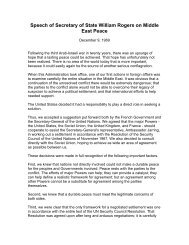2013 Briefing Book - Print Version - Aipac
2013 Briefing Book - Print Version - Aipac
2013 Briefing Book - Print Version - Aipac
You also want an ePaper? Increase the reach of your titles
YUMPU automatically turns print PDFs into web optimized ePapers that Google loves.
PEACE PROCESS<br />
THE U.S.-ISRAEL RELATIONSHIP TRANSCENDS THE PEACE PROCESS<br />
Beyond the peace process, the United States and Israel have a deep alliance, based on common<br />
values, that benefits both countries. The two allies share intelligence, cooperate extensively<br />
regarding defense measures and work to counter the mutual threats of terrorism and proliferation.<br />
It is critical that this vital cooperation be maintained irrespective of the daily ups and downs of<br />
Israel’s negotiations.<br />
Similarly, the United States should assert its position as a trusted ally of Israel, providing the<br />
support and assurance so essential to Israeli leaders as they consider tough compromises for<br />
peace. Differences should be worked out with Israel privately. Public differences have allowed the<br />
Palestinians to stall U.S. efforts to get the sides back to the negotiating table.<br />
DIRECT TALKS—NOT IMPOSED SOLUTIONS—ARE THE KEY TO SUCCESS<br />
An enduring solution to the Israeli-Palestinian conflict must arise from the parties themselves and<br />
cannot be imposed by the United States or other outside parties, as President Obama has made<br />
clear. “The United States will put our full weight behind this effort,” he said. “We will be an active<br />
and sustained participant. We will support those who make difficult choices in pursuit of peace.<br />
But let me be very clear. Ultimately the United States cannot impose a solution, and we cannot<br />
want it more than the parties themselves.” A deal can only work if both parties enter into it<br />
willingly, feel vested in it and intend to implement it. Without buy-in from the two parties and the<br />
publics they represent, no accord will be viable.<br />
UNILATERAL STEPS ARE NOT HELPFUL<br />
The Palestinians’ non-member state upgrade at the U.N. General Assembly and continued pursuit<br />
of membership in other U.N. bodies and international organizations push the parties further from<br />
resuming direct talks. Such moves outside the context of talks with Israel are highly destabilizing,<br />
undermine trust and fail to advance the goal of a negotiated peace agreement as advocated by the<br />
United States. That is why direct, sustained bilateral negotiations—which can be facilitated by the<br />
United States—are still the best way forward.<br />
145








